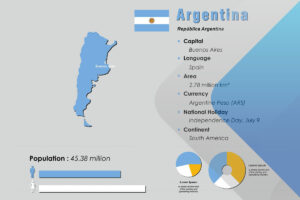Employer of record in Argentina
We make it easy and smooth to expand your business into Argentina. Forget dealing with local regulations, confusing tax laws, and international payroll management. We take care of all that, so you don't have to.

Accelerate your growth into Argentina compliantly and hassle-free
At Serviap Global, we handle all employee onboarding, payroll, compliance, risk, mitigation, and benefits so you can focus on what matters most: your business.
How we can help you expand in Argentina
As your EOR in Argentina, we’d help you expand by hiring employees and running their payroll without establishing a local branch office or subsidiary.
Your candidate is hired by a PEO in Argentina provider under local labor laws and can be onboarded in days instead of the months it
typically takes. Shortly after, your new employee
will work for you like any other team member.


Expand to Argentina with Serviap Global
Through our PEO and EOR services, you can hire qualified talent in your industry without opening a legal entity.
In just a few days, you can quickly and safely build a presence in Argentina, ensuring your staff will be hired in compliance with labor and tax regulations.
Quick facts
Currency:
Argentine Peso (ARS)
Capital:
Buenos Aires
Payroll cycle:
Monthly
Language:
Spanish
The economy
Argentina is defined as an “emerging market” by the FTSE Global Equity Index. It is also one of the G-20 major economies. Argentina is the second-largest economy in South America after Brazil. The 20th Century saw uneven economic performance, with periods of high economic growth followed by severe recessions.
Between 2003-2015, Argentina saw a time of economic stagnation and isolation. Since 2015 however, political leaders of several parties are pursuing economic reform and international reintegration. Due to its large network of quality universities, Argentina boasts a highly qualified talent pool of young people, especially in the tech sector.
Argentina has a plethora of natural resources. It also has an export-centric agriculture sector(agricultural goods comprise over 50% of their foreign exchange) and a diversified industrial base.
The importance of small and medium-sized companies
Almost 90% of Argentina’s businesses are small and medium enterprises (SMEs) and represent 69% of employment in the country. SME activity is concentrated in the areas where there is an abundance of talent and capital — Buenos Aires, Santa Fe, Cordoba, and Mendoza.
The main sectors to run a successful business
1. The service sector in Argentina comprises nearly 64% of GDP. Within this sector, the most promising industries include:
• Wholesale and retail trade which is 14% of the GDP
• Transport warehousing and communications at 12.2% of GDP
• Real estate at 12%
• Education health and social services at 7.2%
• Financial intermediation at 7%
2. The industrial sector is the second largest comprising 25% of the GDP. Within this sector, the best areas for setting up a business are:
3. Manufacturing at 15% of the total GDP
4. Construction at 5%
Characteristics of the Argentinian population
- The population density is only 15 people per square km, much below the world average of 50.
- The growth rate of the population is around 0.92% per year.
- Argentina has a fairly young population over 64% of the population is between 15 to 64 years.
- However, the percentage of senior citizens (65+) is also quite high — 10.8%.
- The median age in Argentina is 30.
- Argentina is the second-largest country in South America and the 8th-largest in the world
- It is bordered by the Andes mountains in the west and the South Atlantic Ocean to the east
- It is surrounded by some of the strongest economies of Latin America — Chile to the west, and Brazil and Uruguay in the northeast.
- The consumer preferences in Argentina are closer to preferences in Europe rather than Latin America.
- In the past few decades, thanks to the economic turmoil, the population has become more value- conscious. They buy only when necessary and household spending has fallen.
- There is a clear preference for locally produced products, as opposed to imported ones.
- Younger consumers and the wealthier population are more brand conscious and willing to pay higher prices for better brands.
Economic opportunities
- Stringent rules governing working hours and working conditions, providing salaries during illnesses, surcharge on overtime salaries, provision of annual vacations, and severance for unfair dismissal.
- Argentine labor law comprises public orders. This means it can’t be waived by any agreement.
- Employees in Argentina are entitled to a Statutory annual bonus. It’s payable in two semi-annual installments and is due on June 30 and December 18 of each year. Each installment is equal to 50% of the highest salary in the previous semester.
- Employers need to pay for compulsory life insurance for all employees.
- Argentina has a world-class education system that’s focused on technology skills. In fact, higher education in Argentina is free. Plus, a large percentage of the population speaks English (42.3%). Due to this, Argentina is emerging as a major outsourcing hub for software development. In fact, Coursera’s Global Skills Index ranked Argentina as the Number 1 country in terms of technology skills.
- Argentina is only 1-2 hours ahead of the Eastern Standard Time and around four hours ahead of Pacific Time. It’s also just four hours behind London. This makes it the perfect location to have a remote workforce.
- Argentina, especially Buenos Aires, has taken the lead in cutting-edge technology. This includes fintech (Mesfix, Afluenta, etc) and blockchain (Bitex, InvestoLand, etc).
- There is massive investment in telecom infrastructure. Successive spectrum auctions are increasing this investment rapidly. Foreign companies like China’s Huawei and Spain’s Telefonica SA play a big role in this sector.
- Information Technology and Software is also seeing massive growth. The sector has seen 20% annual growth since 2000.
- Oil and gas technology is also experiencing heightened demand. There’s a preference for US technology giants like Halliburton, Baker-Hughes, and Schlumberger among others.
- The Latin American Integration Association aims to create a common market for its member countries. It was created by the Montevideo Treaty of 1980 and includes Mexico and all Latin American countries in South America. As part of the efforts of the LAIA, duty concessions have been extended to many products that are shipped by other LAIA countries.
- In March 1991 Argentina, Brazil, Paraguay, and Uruguay signed a treaty to create a common regional market (MERCOSUR). This way all the barriers between the countries in the exchange of assets, services, and factors are now gone. With the LAIA and the MERCOSUR, many of the disadvantages faced by the individual countries are now being removed. Instead of protectionism, a culture of competition and economies of scale is now developing.
- While trademark registration can be done for a maximum of 10 years, the trademark can now be renewed indefinitely which is great for R&D. Plus, Argentina has accepted the 1883 Paris Agreement for the Protection of Industrial Property. It protects trademarks that have been registered with the National Industrial Property Institute (INPI).
Argentine gastronomy: global influence, local innovation
Argentine cuisine has always been a blend of global influences. This started with the Mediterranean taste from the Italian and Spanish immigrants during the colonial period. Then there’s the influence of Native American cuisine as well.
While the Asado (Argentine barbeque) is the one dish that represents Argentina’s gastronomy, most other dishes are influenced by global tastes. Global foods like patties, pasta, and french fries all have their own unique flavor as part of Argentine cuisine.
Argentinians are known for their love of food and an invitation to a meal is often a symbol of warmth and friendship. Homemade food is a way for people to express their affection. As far as restaurants are concerned, the big cities tend to have huge diversity — from traditional taverns (bodegones) to high-end international outlets to simple canteens.
General highlights
Capital | Buenos Aires |
States / provinces | 23 provinces |
Principal cities | Buenos Aires, Cordoba, Rosario, La Plata, and San Miguel Tucuman |
Language | Spanish |
Local currency | Argentine peso (ARS) |
Date format | dd-mm-yyyy |
Thousands separator format | 999.999.999,99 |
Country dial code | +1 54 |
Time zone | Argentina Time – ART (UTC -3) |
Population | 46.23 million (2022) |
Border countries | Bolivia, Paraguay, Uruguay, Brazil, and Chile |
Continental surface | 2,780,400 km2 |
Tax year | January 1st– December 31st |
Minimum wage | ARS$65,427 per month |
Tax payer identification number name in the country | CUIT – Unique Tax Identification Code |
CUIL – Unique Labor Identification Code |
Laws that regulate labor relationships
Listed below are laws governing the employment relationship of the worker and the employer in Argentine. The relevant rules regarding labor law, its practical application, and additionally the laws in force regarding dismissal, work accident, pension system, retirement and pensions are also detailed. Rights and legal defense of the worker.
| Laws | Brief description |
| Law 24.430: Argentine National Constitution | Maximum law in Argentina |
Law 24.013: National Employment Law | This law handles the following points: |
| The non-register employment regularization | |
| Promotion and defense of employment | |
| Protection of unemployed workers | |
| Employment training and statistics National Employment, Productivity and Salary Council Minimum, Vital and Mobile | |
| Temporary unemployment benefit | |
| Compensation for unjustified dismissal | |
| Law 11.544: Labor Day Law | This law establishes the workday |
| Law 24.557: Labor Risks Act | In its theoretical framework, it proposes the prevention of accidents at work and occupational diseases, in addition to assuring the appropriate worker medical attention in a timely manner, ensuring its restoration. |
| Law 25.323: Workers Compensation | It is established that the compensation provided for by Law N ° 20,744 or those that replace them in the future, will be doubled in the case of an unregistered or deficient labor relationship. |
Key tax and labor authorities
| Laws | Brief description |
| Ministry of Economy | The Ministry of Economy of the Argentine Republic is one of the six agencies that are responsible for assisting the president of the Argentine Nation and the head of the Cabinet of Ministers, in economic policy, internal trade and economic, financial and fiscal relations with the provinces and the Autonomous City of Buenos Aires. |
| Production and Labor Ministry (Ministry of Productive Development) | The Ministry of Productive Development of Argentina is the government agency responsible for designing and executing plans related to the promotion of the country’s industrial production, as well as foreign trade. |
| Federal Administration of Public Revenue (AFIP) | The Federal Administration of Public Revenue (AFIP) is the agency responsible for the execution of the tax, customs and collection policy of social security resources of the Nation. |
Labor contracts
There is an employment relationship when a person voluntarily and personally develops tasks for another natural person or company, under their dependency, receiving compensation in return.
The Labor Contract Law presumes that if the above conditions are met, even if the parties – worker and employer – do not enter into a written employment contract, there will be an employment relationship, generating for both parties all the rights and obligations of established by law.
Types of contracts
It is presumed that employment contracts have an indefinite term unless there is a specific legislation that indicates otherwise.
Contract for an indefinite time Article 99, Law 20744 | The employment contract shall be deemed to be concluded for an indefinite period, unless its term results from the following circumstances: a) That the time of its duration has been set expressly and in writing; b) That the modalities of the tasks or activity, reasonably appreciated, justify it. The formalization of contracts for a determined period in successive form, which exceeds the requirements provided in section b) of this article, converts the contract into one for an indefinite period of time. |
Contract for specific work or time Article 102, Law 20744 Season Contract Article 105, Law 20744 | The fixed-term work contract will last until the expiration of the agreed period, and cannot be celebrated for more than five (5) years. |
| Season Contract Article 105, Law 20744 | There will be a seasonal employment contract when the relationship between the parties, originated in permanent needs of the company or exploitation, is fulfilled at certain times of the year only and is subject to being repeated for a given period due to the nature of the activity. |
| Temporary Work Contract Article 108, law 20744 | Regardless of its denomination, it will be considered to be an eventual work contract when the activity of the worker is exercised under the dependence of an employer for the satisfaction of concrete results. It will also be understood that such relationship mediates when the link begins and ends with the completion of the work, the execution of the act or the provision of service for which the worker was hired. |
Basic requirements
The information that the contract must contain is established in the Article 56 of the Law 20744.
- Name of the employee
- Marital status
- Date of entry and exit
- Remunerations assigned and received
- Individualization of persons that generate the right to the perception of family allowances
- Other data that allow an exact evaluation of the obligations under their charge
Payroll
Law benefits in Argentina
| Benefits | Brief description |
Salary Article103, Law 20744 | It is understood as the compensation that the employee must receive as a result of the employment contract. Said remuneration may not be less than the minimum wage. The employer owes the worker the remuneration, even if he does not provide services, simply because he has put his work force at his disposal. |
Vacations Article 150, Law 20744 | The worker will enjoy a minimum and continuous period of paid annual rest for the following periods: | |
| 1 – 5 years | 14 days of vacation | |
| 5 – 10 years | 21 days of vacation | |
| 10 – 20 years | 28 days of vacation | |
| Greater than 20 years | 35 days of vacation | |
| Vacation bonus Article 16, Law 20744 | The worker will receive compensation during the holiday period, which will be determined as follows, the employee will receive 25% of the salary for the days given. The remuneration corresponding to the holiday period must be paid upon its initiation of vacation period. | |
Supplementary annual salary (Christmas bonus) Article 121 and 122, Law 20744 | Supplementary annual salary is understood a 13th paid month, received by the worker in the respective calendar year. It will be paid in two installments: the first one on June thirty and the second on December thirty-first of each year | |
Special leaves Article 158 Law 20744 | The worker will enjoy the following special leaves: | |
| a) By birth of a child, two (2) calendar days | ||
| b) By marriage, ten (10) calendar days | ||
| c) Due to the death of the spouse or the person with whom he was united in apparent marriage, under the conditions established in this law; of children or parents, three (3) calendar days. | ||
| d) Due to the death of a brother, one (1) day | ||
| e) To take an exam in secondary or university education, two (2) consecutive days per exam, with a maximum of ten (10) days per calendar year. | ||
| The licenses referred shall be paid. | ||
Employers contribution or labor cost
The employer contributions turn out to be those sums of money that the employer will be obliged to contribute to the state for having employees. They are not recoverable for the employer and turn out to be indispensable for employees since this covers part of what is paid to social security.
| Contribution | Brief description |
| Social security | The social security contributions are those that the employer has the obligation to pay to the state, every month, as a work tax. This contributions are destined to retirement and pensions, PAMI social work, family allowances, national employment fund and social work. |
| Argentine Integrated Pension System (SIPA) | SIPA is the Argentine Integrated Pension System. It is the only retirement system that governs in Argentina after the elimination of the AFJPs. This is mandatory for all workers in dependency and non-dependent relationships. That is, it is mandatory for all formal employment in Argentina. |
| National Institute of Social Services for Retirement and Pensions (PAMI) | On May 13, 1971, the National Institute of Social Services for Retired and Pensioners was created, better known as PAMI – Comprehensive Medical Assistance Program -, in order to provide medical, social and welfare care to a specific population: the elderly. |
| Work Risk Insurance (ART) | The employer is required by law to hire an Occupational Hazard Insurer (ART) or to insure itself to cover all its employees in the event of work-related accidents or occupational diseases. ARTs are private companies that aim to provide the benefits provided by the Labor Risk Law. Every worker has the right to enjoy an ART. |
| Mandatory life insurance | The Obligatory Collective Life Insurance provided in Decree No. 1567/74 covers the risk of death and includes suicide as compensable, without limitation of any kind, of any worker in dependency relationship. The lack of contracting of the insurance coverage will constitute an infraction, and the employer will be directly responsible, paying the benefit of the insurance in the event of the worker’s death. This life insurance does not cover the risks of total, absolute, permanent irreversible disability, but only covers the risks of death of the worker. |
| Family Allowance Scheme (SUAF) | The SUAF is an economic assistance given to a worker in a dependency relationship, that is, who works in white or a retiree who is in charge of a child under 18 years of age. Under the SUAF (Single Family Allowance System) the following benefits are paid: • Prenatal • Maternity • Son • Child with disability |
| National Employment Fund | Unemployment Insurance provides it legally laid off without just cause, a monthly payment, family allowances and medical coverage while they are temporarily unemployed. |
| Social work | The social works are “social security organizations, financed through the mandatory contribution of workers and employers, subject to state comptroller and integrated into the National Health Insurance System, whose purposes are the provision of health services and social benefits, the employees have the option of choosing to join the Entity that has to provide these services to them”. |
Types of disabilities
An accident is considered to be any event that occurred during the work activities, or during the journey between the worker’s address and the place of work, as long as the victim has not interrupted or altered the route for any reasons beyond work.
Occupational diseases are considered to be those that are included in the list of Occupational Diseases prepared and reviewed annually by the Executive Power. Each accident that prevents the provision of the service will not affect the worker’s right to receive their remuneration for.
| Worker without dependents | |
| Less than 5 years of seniority | 3 months of remuneration |
| More than 5 years of seniority | 6 months of remuneration |
| Worker with dependents | |
| Less than 5 years of seniority | 6 months of remuneration |
| More than 5 years of seniority. | 12 months of remuneration |
| Types of disability | Brief description |
Temporary work disability | Temporary Work Disability occurs when a worker is injured or has a professional illness, and the damage suffered prevents him from performing his usual duties. This disability begins on the date of the first invalidating manifestation and ends when the worker receives the medical discharge, or is declared a Permanent Labor Disability, or if he dies. |
Permanent work disability | It is considered that a worker suffers a permanent labor disability, when the damage caused by the accident at work or the occupational disease caused him a decrease in his ability to work that will last throughout his life. Permanent work disability can be partial or total degree: Partial permanent labor disability is one whose percentage of disability is less than 66%. Total permanent labor disability is considered when the percentage of disability is greater than 66%. The degree of permanent disability is determined by the Medical Commissions. All permanent disabilities result in the payment of a one-time cash benefit. |
Great disability | It is considered that a worker is in a situation of great disability when he has a total permanent labor disability and needs the continuous assistance of another person to perform the elementary acts of life. |
Death | If the worker died due to labor causes, the rightful recipients will receive a single payment. Widows, cohabitants, as well as unmarried sons or daughters and widowed daughters (as long as they do not enjoy retirement, pension), they are all considered entitled until 21 years old. The limitation to the established age does not apply if the right holders are incapacitated for work at the date of death of the deceased, rising up to 25 years in the case of exclusively dependent students of the deceased worker. In the absence of the persons listed, the worker’s parents will access in equal parts; if one of them had died, the benefit will be received in full by the other. In the event of the death of both parents, the benefit shall correspond, equally, to those relatives of the deceased worker who prove to have been in their care. |
Workday, holidays, and sick leave
Workday is the time during which the worker is available to the employer to lend his service.
The worker and the employer will set the duration of the workday, without exceeding the legal maximum of 8 hour per day, 48 hour per week.
For every six days of work the employee must enjoy a rest day, at least. The work day may also be extended due to extraordinary circumstances:
- Maximum 3 hour per day (in a week it can not exceed 8 hours of overtime)
- Maximum 30 hours per month
- Maximum 200 hours per year
- Law No. 26,199 issued in commemoration of the genocide suffered by the Armenian people. Employees and officials of public sector and students of Armenian origin are allowed to freely dispose of April 24 of each year to attend and participate in activities carried out in commemoration of the tragedy that affected their community. Provincial governments are invited to adhere to the provisions of this law.
- Only for inhabitants who profess the Jewish religion, provided by Article 2 of Law 27,399
| Type of workday | Working hours per day | Overtime | Sundays |
| Day shift | 8 hours | An additional 50% of the salary | The employee will be entitled to 100% over salary on Saturdays after 13 pm, Sundays and holidays. |
| Night shift | 7 hours | ||
| Unhealthy and or dangerous work | 6 hours |
Public holidays
| Date | Holiday name |
| January 1st | New Year |
| March 4th | Carnaval |
| March 5th | Carnaval |
| March 24th | National Day of Remembrance for Truth and Justice |
| April 2nd | Veterans Day and those killed in the Falklands War |
| April 19th | Holy Friday |
| May 1st | Labors Day |
| May 25th | May Revolution Day |
| June 20th | Day Pass to the Immortality of General Manuel Belgrano |
| July 9th | Independence Day |
| December 8th | Immaculate Conception |
| December 25th | Christmas |
Migration process
- Valid passport with a minimum validity of 6 months at the date of entry into the country
- Two current 4x4cm photographs, front, color, white background
- Full visa application form and signed by the applicant
- Proof of residence in the jurisdiction of the Consulate
- Certificate of criminal records apostilled or legalized, issued by the competent authority of the country of residence
- Commitment to tell the truth or Affidavit of lack of criminal record in other countries
- Pre-employment contract signed by both the employer and the employee; the contract must contain:
- Personal data of both parties
- Task to be carried out by the employee
- Duration of the working day
- Labor relationship duration
- Address of where the employee will be living during her/his stay in the country
- Remuneration
- Employer CUIT Number
- Contract signatures must be certified by a notary public or before an agent of the national migration directorate at the time of initiating the residency application.
- Proof that the employer has registration before the Federal Administration of Public Income (AFIP); and before Single Register of Foreign Applicants of the National Immigration Office.
Employee termination
| Worker on: | Minimum days of notice |
| Probation | 15 days |
| From 3 months to 5 years | 1 month |
| From 5 years and on | 2 months |
Labor termination causes
The employment contract will end in the following cases:
- Mutual agreement of the
- Resignation of the worker, giving notice to his employer thirty days in advance, at
- Death of the
- Expiration of the term agreed in the The duration of the fixed term contract can not exceed one year
- Conclusion of the work or service that gave rise to the
- Fortuitous event or force majeure
Labor termination settlement or compensation
If the contract has been valid for a year or more and the employer terminates with out a just cause, the worker must be paid a compensation for the years of service.
- 30 days of salary for each year of service and fraction greater than 6 months, with a maximum of 330 days
- The payment of the notice days, if they where not given the prior notification
- Proportional vacations not taken
If the employee was contracted by a specific work or task, and the relation ends before, they will have the following compensation:
- 5 days of remuneration for each month worked, and fraction greater than 15 days
The settlement, resignation and mutual agreement must be established in writing. The settlement must be granted by the employer and made its payment available to the worker within ten business days, counted from the separation of the worker.
The employment contract ends without the right to compensation when the employer terminates it by invok- ing one or more of the following causes:
- Some of the misconduct of a serious nature, duly proven, that are indicated below:
- Lack in the performance of their duties
- Sexual harassment behaviors
- Injuries issued by the worker to the employer
- Immoral conduct of the worker that affects the company where he works
- Workplace harassment behaviors
- Negotiations executed by the worker within the business and that have been prohibited
- Non-attendance of the employee to his work without just cause for two days in a row
- Abandonment of work by the worker, understood as such:
- The untimely and unjustified departure of the worker from the job site and during working hours, with- out the permission of the employer or his representative
- The refusal to work without justified cause in the tasks agreed in the contract
- Acts or recklessness that affect the safety or operation of the establishment, the safety or activity of the workers, or their health
- The material damage caused intentionally in the facilities, machinery, tools, work tools, products or mer- chandise
- Serious breach of the obligations imposed by the contract.
You might be interested in reading...
Your one-stop global hiring solution. Secure, reliable, compliant

Premium Support
No matter how big or small, we are ready to answer all your questions- anytime, anywhere.

Regional expertise
Our team of in-country experts help you navigate new markets and cultural nuances

Top-tier Benefits Packages
Great talent deserves great benefits. We offer a competitive range of benefits so that you only attract top-tier talent worldwide.

You remain 0% liable
Shift the worry from your shoulders to ours! We stay on top of regulations so you’re always 100% complaint with local laws
Contact us and start your business expansion today












